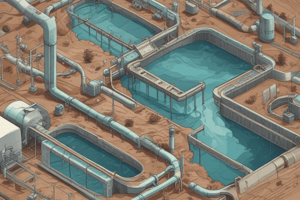Podcast
Questions and Answers
All of the following may result as a consequence of untreated waste water disposal except ----
All of the following may result as a consequence of untreated waste water disposal except ----
- Enhanced dissemination of pathogenic microbes
- Accumulation and dissemination of toxic chemicals that endanger ecosystems and threaten public health.
- Eutrophication / algal bloom of natural bodies of water
- None of the above (correct)
Pollutants that are found in wastewater may be------
Pollutants that are found in wastewater may be------
- Pathogenic microorganisms
- Particulate, Colloidal, and dissolved organic matters
- a and b, plus Dissolved inorganic nutrients (P, N others) (correct)
- None of the above
The biochemical reaction of the fecal coliform bacteria, E. coli includes all, except ____
The biochemical reaction of the fecal coliform bacteria, E. coli includes all, except ____
- Indole and methyl red test positive.
- Pink colonies on EMB agar (correct)
- Vogus-Proskauer and citrate test negative
- Pink colonies on MacConkey agar
The main objectives of sewage treatment includes ___
The main objectives of sewage treatment includes ___
Which of the following is not true about the BOD of wastewater?
Which of the following is not true about the BOD of wastewater?
A typical primary wastewater treatment procedure involves __________
A typical primary wastewater treatment procedure involves __________
Aerobic secondary wastewater treatment may involve all, except, _________
Aerobic secondary wastewater treatment may involve all, except, _________
The scarcity of water for proper hygiene and sanitation may lead to all, except ____
The scarcity of water for proper hygiene and sanitation may lead to all, except ____
The anaerobic sludge digestion in the secondary sewage treatment involves ____
The anaerobic sludge digestion in the secondary sewage treatment involves ____
Activated sludge process involves _________
Activated sludge process involves _________
Flashcards are hidden until you start studying
Study Notes
Consequences of Untreated Waste Water Disposal
- Untreated waste water disposal can lead to various consequences, including pollution, health problems, and environmental damage.
Pollutants in Wastewater
- Wastewater may contain pollutants such as suspended solids, organic matter, pathogens, and nutrients.
Biochemical Reaction of E. coli
- The biochemical reaction of E. coli involves fermentation, respiration, and decomposition, but not photosynthesis.
Objectives of Sewage Treatment
- The main objectives of sewage treatment include removing pollutants, reducing organic matter, and eliminating pathogens.
Biochemical Oxygen Demand (BOD)
- BOD is not a measure of the amount of oxygen in wastewater, but rather a measure of the amount of oxygen required for microbial decomposition.
Primary Wastewater Treatment
- A typical primary wastewater treatment procedure involves physical processes such as sedimentation, flotation, and filtration to remove suspended solids and organic matter.
Aerobic Secondary Wastewater Treatment
- Aerobic secondary wastewater treatment may involve processes such as activated sludge, trickling filters, and oxidation ponds, but not anaerobic digestion.
Scarcity of Water for Hygiene and Sanitation
- The scarcity of water for proper hygiene and sanitation may lead to health problems, increased risk of disease, and environmental degradation, but not improved water quality.
Anaerobic Sludge Digestion
- Anaerobic sludge digestion in the secondary sewage treatment involves the breakdown of organic matter by microorganisms in the absence of oxygen, producing biogas and a stable sludge residue.
Activated Sludge Process
- Activated sludge process involves the use of microorganisms to break down organic matter in wastewater, producing a stable sludge residue and a treated effluent.
Studying That Suits You
Use AI to generate personalized quizzes and flashcards to suit your learning preferences.




